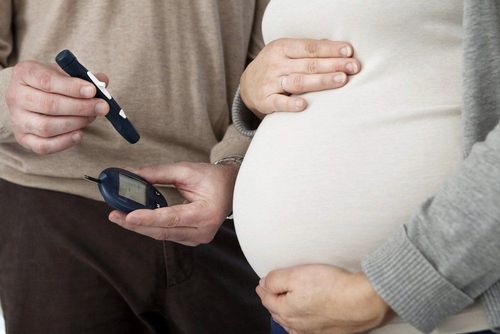This is an automatically translated article.
The article is professionally consulted by Master, Doctor Nguyen Van Thanh - Obstetrician and Gynecologist - Department of Obstetrics and Gynecology - Vinmec Ha Long International HospitalPregnant women with diabetes will face many different health problems. Gestational diabetes if not well controlled blood sugar level can affect the fetus and have the risk of dangerous complications such as too large fetus, birth defects, respiratory disorders.
1. Can I get pregnant with diabetes?
Diabetes (also called "diabetes") most often occurs when there is an insulin-related disorder. Insulin is responsible for taking glucose (sugar) out of the blood into living cells and converting them into energy. When the body doesn't produce enough insulin or can't meet its insulin needs, glucose levels rise, but it doesn't get into cells, but stays in the blood. As a result, blood glucose (blood sugar) levels increase. Over time, elevated blood sugar can damage the body and lead to many serious health problems, such as heart disease, impaired vision, and kidney failure. So can women with diabetes get pregnant?In fact, it is completely possible for a woman to get pregnant when she has diabetes. However, people with gestational diabetes will often have certain risks that affect the pregnancy and the baby.
2. Is gestational diabetes dangerous?
If your diabetes isn't well controlled, you're at increased risk for some diabetes-related complications. The following problems are likely to occur in pregnancies with diabetes :Birth defects High blood pressure Polyhydramnios: In this condition, the amount of amniotic fluid increases, the risk of having a translocation occurs preterm labor and premature birth. Fetal too large: The fetus has a higher than normal weight. Due to the process of development, the fetus receives too much glucose from the mother and overgrows. A baby that is too large makes delivery more difficult and increases the risk of a cesarean section.
3. Does diabetes affect the fetus?
Babies born to pregnant mothers with diabetes are more likely to have breathing problems, low glucose levels, and jaundice. The baby's weight is also higher than normal (weighing more than 4 kg). However, most babies are healthy, although a few need special care for a while after birth. However, people with gestational diabetes can reduce their risk of these problems if they can control their diabetes well.4. Control blood sugar before pregnancy
During your visit, your doctor will help you come up with a plan to control your blood sugar levels before you get pregnant (if you haven't already). Controlling glucose levels for pregnant women with diabetes is very important because elevated maternal blood sugar can cause some birth defects. The risk of birth defects occurs when your baby's organs are still developing, often during the first 8 weeks of pregnancy, before you even know you're pregnant. Controlling glucose levels in people with pre-pregnancy diabetes often requires a combination of medication, diet, and exercise.
5. Controlling diabetes during pregnancy
During pregnancy, you can stabilize your blood sugar by combining a reasonable diet, exercise, and medication as directed by your doctor. In addition, pregnant women with diabetes need to see their doctor more often than scheduled. During such routine visits, you will have your glucose levels checked and various tests performed.6. Blood sugar test during pregnancy
To monitor blood sugar levels during pregnancy, your doctor will perform a type of blood test called an HbA1C test. The advantage of this test is that the test results can reflect how well you've controlled your blood sugar over the past 4-6 weeks.7. Effects of pregnancy on diabetes progression
Pregnant women with diabetes are more likely to have hypoglycemia, a condition in which blood sugar levels drop below normal. Low blood sugar can happen if you don't eat enough food, skip meals, don't eat on time, or even exercise too much. Talk to your doctor so you and your family members know what to do if you notice symptoms of low blood sugar, such as dizziness, feeling shaky, sudden hunger, sweating, or weakness.8. Diet for pregnant women with diabetes
A well-balanced, healthy diet is an important part of a healthy pregnancy, as your baby's growth and development is largely dependent on the foods you include in your daily routine. In pregnant women with diabetes, diet is even more important. Eating improperly can cause blood sugar to rise too high or too low, affecting both mother and fetus. Talk to your doctor to set up a diet that's right for you.9. Exercise is important for a pregnant mother with diabetes
Exercising not only helps keep blood sugar levels within normal limits, but has many other benefits, including weight control, improved health, improved sleep, reduced back pain, and more. constipation and flatulence.
10. Taking medication to control gestational diabetes
Before pregnancy, diabetics often take insulin to control blood sugar. During pregnancy, your doctor will usually increase your insulin dose. Insulin is a safe drug to use during pregnancy and does not cause birth defects affecting the fetus. Automatic insulin pump therapy can be used before and during pregnancy. However, in some cases you may need to switch to injectable insulin.If a patient with diabetes usually controls their blood sugar with oral medication, their doctor may recommend a change in dosage or a switch to insulin during pregnancy.
11. How does diabetes affect delivery?
For pregnant women with diabetes, labor may come sooner, especially if there are problems with the pregnancy. During labor, glucose levels will be closely and continuously monitored hourly. If necessary, the doctor may administer insulin intravenously. Alternatively, an automatic insulin pump can be used during labor.12. Should diabetics breastfeed?
Women with diabetes after giving birth should breastfeed their babies. Breastfeeding will bring the best source of nutrition to strengthen the child's resistance and breastfeeding also brings benefits to the mother. Breastfeeding helps mothers lose extra pregnancy weight after giving birth and helps the uterus return to normal size quickly.Maternity package program at Vinmec International General Hospital helps customers complete the antenatal check-ups and necessary tests during pregnancy, including screening tests for gestational diabetes. Customers registered for Maternity Package are fully cared for and checked for health of mother and baby before birth - during childbirth and after birth, fully and conscientiously. Vinmec currently has maternity packages including:
Maternity care program 2019 – Labor Maternity care program 2019 – 36 weeks Maternity care program 2019 – 27 weeks Maternity care program 2019 – 12 weeks
Please dial HOTLINE for more information or register for an appointment HERE. Download MyVinmec app to make appointments faster and to manage your bookings easily.
References: Acog.org














